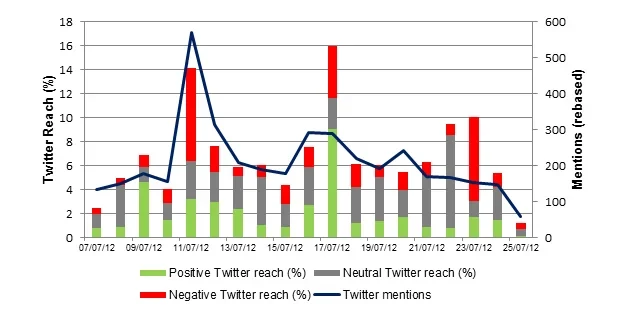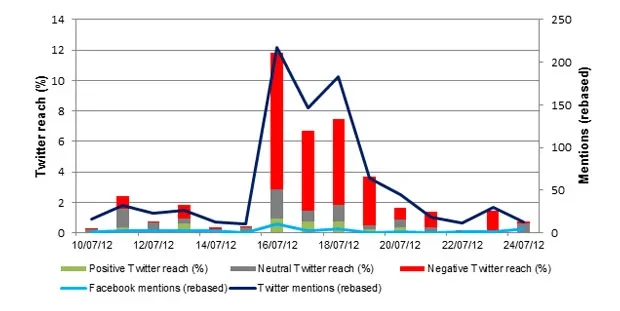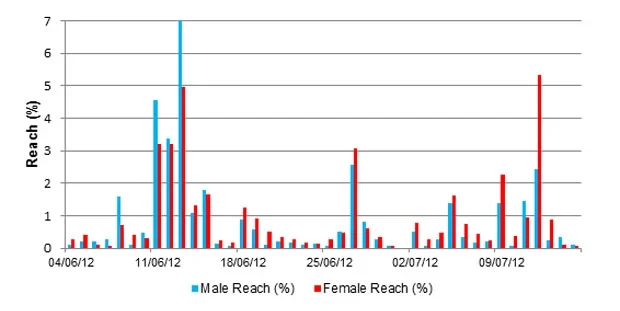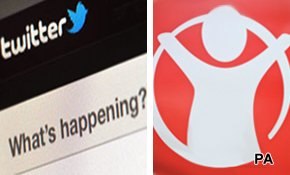New social media measuring tool YouGov SoMA shows charities' potential to help further their causes
Charities and campaigning organisations are using online tools more than ever, to measure the effectiveness of campaigns among the public or to help them understand how, where and to whom they should promote their causes.
Here are a few examples of online campaigning making significant gains for charities in the last week.
McDonald’s and 38 degrees
On July 11th, NGO 38 Degrees’ online campaign made a significant gain, in response to the news that Olympic sponsors, including McDonalds, were seeking tax exemptions due to their involvement in London 2012.
8% of Twitter heard something negative about McDonalds on 11th July
14% of the UK Twitter population heard something about McDonalds on July 11th – over half of which was negative.
The most frequent words associated with McDonalds on this day included “Olympics”, “London2012”, “tax”, “petition”, “sponsors”, “corporate”, “38_degrees”, “dodge” – a clear reference to the online petition run by 38 Degrees.
Audiences to negative tweets about McDonalds increased from 1% to 8% from the day before highlighting the impact of the campaign.

In the days that followed the launch of the petition (11th - 16th July), 28% of UK Twitter users heard something about McDonalds, over a third of which was negative.
The most frequent words associated with the brand again linked to the 38 degrees petition. An example of the tweets driving this negative buzz surrounding McDonalds included: “I signed the petition demanding Olympic corporate sponsors turn down their tax-dodge #London2012 @38_degrees @McDonalds http://t.co/lZS1N5sZ” (Posted on 16th July 2012 at 5:40pm)
Shell and Greenpeace
On July 16th, Greenpeace launched an online campaign against Shell, using the energy company’s own public advertisement-building tool to publicise the environmental impact of Shell’s activities in the Arctic.
9% of the Twitter population heard something negative about Shell on 16th July
12% of the Twitter population in the UK heard about Shell on 16th July, over 70% of which was negative. On this occasion, the most frequent words associated with the brand on this included: “greenpeace”, “stations”, “petrol”, “arctic”, “social”, “activists”, “media” and “tellshell”.
Audiences to negative tweets about Shell increased by 9% from the day before – again clearly stimulated by Greenpeace’s campaign.

Greenpeace succeeded in maintaining its presence on Twitter newsfeeds. Between 16th and 21st July, 21% of Twitter heard something about Shell, over 70% of which was negative. These negative mentions continued to achieve high-reach scores of between 5 and 6% on both the 17th and 18th July.
Greenpeace also achieved mentions about its campaign on the private Facebook newsfeeds of our panellists – though July 16th was the clear leading day for this activity.
Save the Children and family planning
In the run up to the Family Planning summit on July 11th, Save the Children ran a month long campaign called 'Give Girls Power'.
Save the Children’s Twitter audience switches from predominantly male to predominantly female!
Between 4th June and 14th July, a six-week period, Save the Children was mentioned on the newsfeeds of 24% of the UK Twitter population.
Significantly during this period, Save the Children’s campaigning audience on Twitter became increasingly female. This is in contrast especially to early June, when Save the Children was reaching more men on Twitter than women. For example on the 12th June, tweets from Arsenal FC among others helped ensure that 3% of Twitter users heard about the charity at least once, 57% of which were male.
By July 12th, the day of the family planning summit – 57% of the people who heard about Save the Children on Twitter were female.
Such switches between audience demographics illustrates just how influential accounts with a particularly orientated following can influence who is hearing about your brand – social media analysis can ensure charities online campaigning utilises a targeted approach.

For more information on YouGov SoMA and to arrange a demo – email the SoMA team at: soma@yougov.com or visit www.yougov.co.uk/soma









